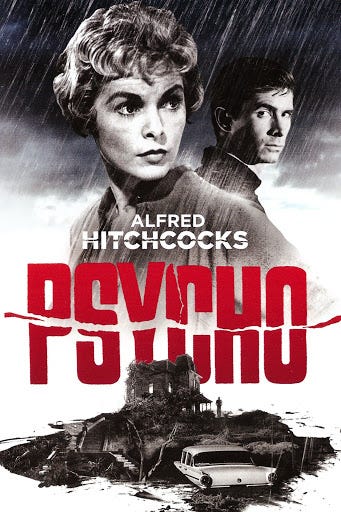Introduction:
In the realm of cinematic history, few films have left as indelible a mark as Alfred Hitchcock’s “Psycho.” Released in 1960, this iconic psychological thriller not only redefined the horror genre but also set new standards for storytelling, suspense, and visual innovation. As we delve into this comprehensive review, we’ll explore the brilliance behind Hitchcock’s direction, the groundbreaking narrative twists, the memorable performances, and the enduring impact that “Psycho” has had on the world of cinema.
I. Setting the Scene: The Birth of a Masterpiece
1.1 Directorial Genius:
- Alfred Hitchcock, already a celebrated filmmaker, took a bold departure from his usual suspenseful fare to create a film that would push the boundaries of storytelling and audience expectations.
- Hitchcock’s meticulous attention to detail, innovative camera techniques, and keen understanding of human psychology played pivotal roles in the creation of “Psycho.”
1.2 Adaptation from the Source Material:
- Based on Robert Bloch’s novel of the same name, the film’s screenplay, written by Joseph Stefano, masterfully adapted the source material to create a narrative that would shock and captivate audiences.
II. Plot and Narrative: A Web of Intrigue
2.1 The Deceptive Opening:
- Hitchcock, known for his suspense-building prowess, ingeniously misleads the audience with the film’s opening sequences, setting the stage for unexpected twists.
- Marion Crane’s character, played by Janet Leigh, is introduced, creating an immediate connection with the audience.
2.2 A Psychoanalysis of Norman Bates:
- The character of Norman Bates, portrayed by Anthony Perkins, becomes the focal point of the narrative.
- Hitchcock and Stefano skillfully navigate the psyche of Bates, revealing layers of complexity that blur the lines between victim and perpetrator.
III. Iconic Characters and Performances:
3.1 Janet Leigh as Marion Crane:
- Leigh’s portrayal of Marion Crane is pivotal to the film’s success, capturing the audience’s empathy and setting the stage for the unexpected twists that follow.
- Her performance in the infamous shower scene is etched into cinematic history as one of the most iconic moments in film.
3.2 Anthony Perkins as Norman Bates:
- Perkins delivers a nuanced and unforgettable performance as Norman Bates, seamlessly transitioning between vulnerability and menace.
- His portrayal of a character grappling with psychological turmoil remains a masterclass in acting.
IV. The Shower Scene: A Cinematic Landmark
4.1 Hitchcock’s Technical Mastery:
- The shower scene, lasting only a few minutes, is a testament to Hitchcock’s technical brilliance.
- Through rapid editing, innovative camera angles, and Bernard Herrmann’s haunting score, Hitchcock creates an unforgettable and visceral cinematic experience.
4.2 Cultural Impact:
- The shower scene in “Psycho” not only shocked audiences but also had a profound impact on filmmaking, influencing subsequent horror and thriller genres.
- The scene is often analyzed and referenced in discussions about suspense, editing, and the power of suggestion in film.
V. Cinematography and Visual Style:
5.1 Cinematic Innovation:
- Hitchcock’s collaboration with cinematographer John L. Russell resulted in a visually stunning film that pushed the boundaries of traditional filmmaking.
- The use of black and white cinematography adds a layer of timeless elegance to the film.
5.2 Symbolism and Visual Metaphors:
- Hitchcock employs visual metaphors and symbolism throughout the film, inviting audiences to engage in deeper analysis.
- The iconic Bates Motel and the unsettling staircase at the Bates residence become symbols of psychological descent and revelation.
VI. Musical Score: Herrmann’s Sonic Masterpiece
6.1 Collaborative Brilliance:
- Bernard Herrmann’s score for “Psycho” stands as one of the most iconic and influential in film history.
- Herrmann’s collaboration with Hitchcock resulted in a musical composition that enhances the tension and atmosphere, becoming inseparable from the film’s identity.
6.2 Strings of Suspense:
- The use of string instruments, especially the piercing violin screeches, contributes to the film’s palpable tension and has become synonymous with the horror genre.
VII. Legacy and Cultural Influence:
7.1 Shaping Subsequent Filmmaking:
- “Psycho” not only redefined horror cinema but also influenced a generation of filmmakers who adopted Hitchcock’s techniques.
- The film’s impact is evident in the evolution of suspenseful storytelling and the subversion of audience expectations in modern cinema.
7.2 Psychoanalytic Critique:
- Academics and film scholars have delved into the psychoanalytic aspects of “Psycho,” exploring themes of identity, sexuality, and the blurred lines between sanity and madness.
VIII. Critical Reception and Awards:
8.1 Critical Acclaim:
- “Psycho” received widespread critical acclaim upon its release, with praise for its innovative storytelling, direction, and performances.
- Despite initial reservations about the film’s controversial content, audiences and critics alike recognized its groundbreaking nature.
8.2 Awards Recognition:
- While not initially embraced by major award ceremonies, “Psycho” has since received retrospective recognition for its cultural and artistic significance.
- Anthony Perkins received a Golden Globe nomination for his performance, and the film itself has been celebrated through numerous accolades and honors.
IX. Conclusion: A Cinematic Paragon
In conclusion, Alfred Hitchcock’s “Psycho” remains a cinematic paragon, transcending the horror genre to become a landmark in filmmaking history. From its deceptive narrative structure to the iconic shower scene and the unforgettable performances, “Psycho” is a timeless masterpiece that continues to captivate and inspire audiences and filmmakers alike. As we revisit this cinematic gem, we are reminded of Hitchcock’s unparalleled ability to manipulate emotions, challenge conventions, and leave an indelible mark on the art of storytelling through film. “Psycho” stands as a testament to the enduring power of cinema to thrill, provoke, and resonate across generations.
